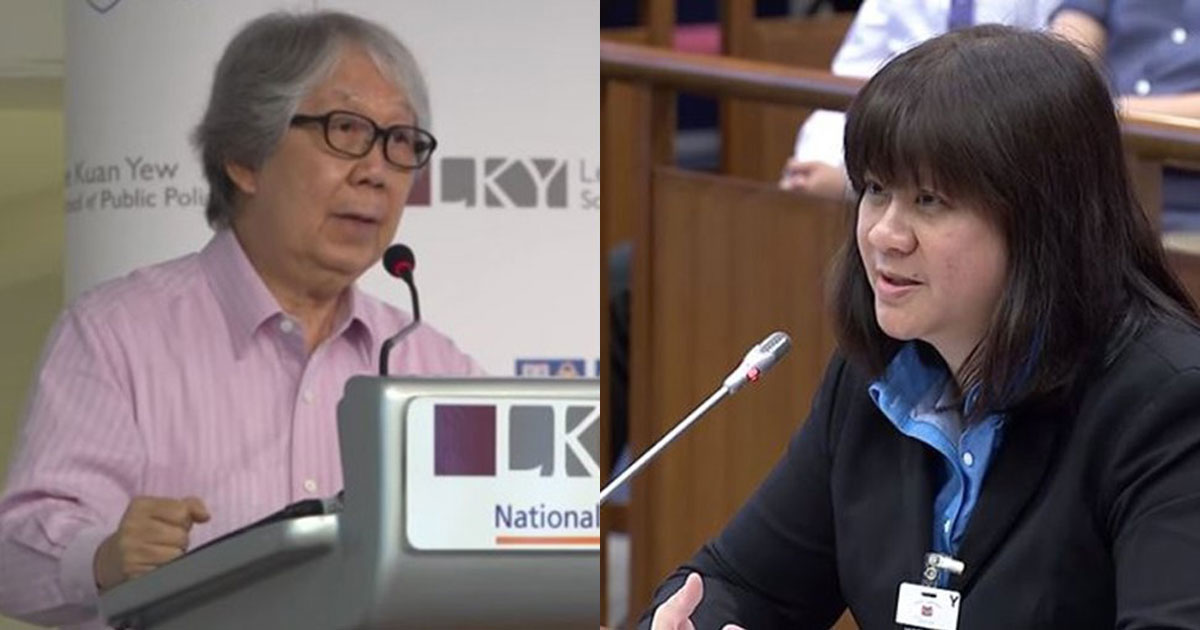The issue of Section 377A, which criminalises sex between men, has generated much attention over the past month.
The two most popular online petitions to either repeal or retain 377A has received more than 150,000 signatures.
And it appears that the mood for online petitions is almost over, with the popular online petition to retain 377A already closed.
Now, both camps have moved on to debating the finer points of Section 377A, with international law and norms as reference points.
Views from religious groups
For context, we have already heard the clear and unequivocal stance from several religious groups, namely the National Council of Churches of Singapore, the Catholic Archbishop, and the Islamic authorities.
So it's now time to hear from two distinguished law professors on the matter.
Tommy Koh: Repeal 377A
On the left is veteran diplomat and law professor Tommy Koh.
Koh first made the headlines with regards to 377A more than two weeks ago with this FB comment.
 Source: Simon Chesterman Facebook
Source: Simon Chesterman Facebook
His comment was made in reference to the news that India struck down a law known as Section 377 that criminalised gay sex.
Koh commented on the Facebook page of Simon Chesterman, Dean of the National University of Singapore Faculty of Law, and urged that the gay community should "try again" to get the law repealed in Singapore.
On Sept. 25, Koh published a commentary (Section 377A: There is a difference between a sin and a crime) in The Straits Times.
Koh used scientific evidence on homosexuality, international norms on sodomy, the difference between sin and crime, and the role of courts to provide the context and the justifications why Section 377A should be repealed.
On scientific studies, Koh cited a World Health Organisation (WHO) decision to delete homosexuality from the Diagnostic and Statistical Manual of Mental Disorders.
He added that the decision was endorsed by the general assembly of WHO in 1990 when it agreed to delete homosexuality from its list of mental disorders.
On international norms, Koh highlighted that a majority (124 states) of the 196 states in the United Nations already do not criminalise sodomy.
He said that Singapore is among the minority of 72 states which do.
On the difference between sin and crime, Koh argued for the need for the separation between religion and the state in Singapore, urging church and Islamic leaders to respect that separation.
On the role of the courts, Koh presented court decisions in the United States and India that had ruled that laws criminalising sodomy as unconstitutional.
In conclusion, Koh argued that the Court of Appeal in Singapore should overturn its 2014 decision and declare 377A to be unconstitutional, as it is "an antiquated law, not supported by science".
Phew.
Thio Li-ann: Retain 377a
Now, let's hear the argument on the right, presented by Thio Li-ann, National University of Singapore law professor and former Nominated Member of Parliament (NMP).
Thio is known for her views in arguing for 377A's retention, especially during the last review of the Penal Code in Parliament nearly 11 years ago.
She has been less vocal this time, until late September.
On Sept. 25, Thio wrote a commentary published in Today ("At level of international law, there is no established human right to 'sexual orientation'").
Her opinion piece was to clarify why certain statements made by human rights group Maruah were incorrect as a matter of law.
But her commentary can be perceived as a commentary for the Retain 377A camp.
Thio argued that there is no established human right to sexual orientation in the realm of international law, and no necessary relationship between a “common secular space” and repealing 377A.
On human rights regarding sexual orientation, Thio said that there is no United Nations (UN) treaty which expressly underwrites discrimination on grounds of sexual orientation.
Moreover, Thio said that sexual orientation rights claims have clashed with other human rights in other countries. Such clashes concern religious freedom, free speech and parental rights to determine (sex) education their children receive.
Thio added that religious groups have the right under article 18 of the Universal Declaration of Human Rights to articulate their views and instruct members of their faith community.
On preserving a common secular space in Singapore, Thio argued that all citizens, whether influenced by religious or non-religious perspectives, have an equal right to participate in public debate in a multi-religious society.
Thio concluded that both religious and non-religious views may be articulated as exercises of free speech, and all views are subject to critical evaluation, as part of the democratic process.
Thus far, though, the government has adopted a neutral stance on the legislation, with two ministers stating its position.
[related_story]
You can read further about it here:
Top photos from YouTube Channel of Lee Kuan Yew School of Public Policy and Gov.sg
If you like what you read, follow us on Facebook, Instagram, Twitter and Telegram to get the latest updates.
